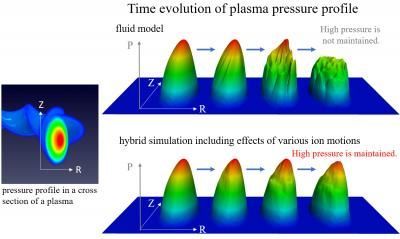The research team of Assistant Professor Masahiko Sato and Professor Yasushi Todo of the National Institutes of Natural Sciences (NINS) National Institute for Fusion Science (NIFS) has succeeded using computer simulation in reproducing the high-pressure plasma confinement observed in the Large Helical Device (LHD). This result has enabled highly accurate predictions of plasma behavior aimed at realizing an economical helical fusion reactor.
In order to realize fusion energy, we must confine high pressure plasma using the magnetic field for a long duration. Although higher pressure plasma can be confined by a stronger magnetic field, it costs more to generate a stronger magnetic field using electromagnetic coils. Therefore, if the magnetic field strength is the same, a device that can confine higher pressure plasma is economically desirable. Because the LHD has succeeded in maintaining high-pressure plasma, there is great expectation in realizing a helical fusion reactor.
Design research for a future fusion reactor is performed based on computer simulations predicting the behavior of magnetically confined plasma. We require highly accurate simulations. To confirm the accuracy, the simulations are required to reproduce the experimental results obtained by the existing devices. However, the simulations had not reproduced the experimental results obtained by the LHD showing that high-pressure plasma is maintained. This has been a serious problem for the design research for an economical helical fusion reactor.









Comments are closed.